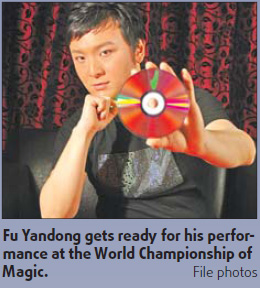There's magic in the air and its not just because of Harry Potter and the Half-Blood Prince. Masters of illusion from all over the world are here in Beijing for the "Olympics of Magic." The 24th International Federation of Magic Societies (FISM) World Championship of Magic (WCM) is being hosted at the National Convention Center from Sunday until July 31.

American magician Arthur Trace is among those cashing in by performing six nights a week throughout the month of July at the Goose and Duck Sports Bar.
At a recent show he peers at the audience from behind a pair of thick-rimmed black glasses. Flashing a broad smile, he produces a small red foam ball, seemingly out of nowhere. Pulling a young Chinese woman from the audience, Trace begins a series of sleight-of-hands, causing the foam ball to disappear and reappear, leaving the crowd chuckling.
Chen Xigang, a 23-year-old student at Beijing Forestry University, was called "Mr. Magician" on campus as he knew one or two tricks. Now, he is holding a wooden stick in front of his girlfriend, which he suddenly snaps, and out pops a rose in his hand, which makes her giggle.
Chen is in the Beijing-based College Magician Union, which connects 1,000 magic fans from more than 10 universities in the capital.
Fu Yandong, 35, is preparing his performance for the WCM and intends to make some dancers appear out of some vases, and fly on the stage. He was born into a magicians' family and did his first trick, aged 6, making two separate rings connect to each other.
"At that time there were no audiences (for magic)," says Fu, but now, he has fans all over the country.
While Chen believes it was Taiwan magician Lu Chen's close-up magic performance in China Central Television (CCTV)'s 2009 Spring Festival Gala that brought back the popularity of this art, Fu believes 2004 was a watershed.
"The program 'Magic Training' on CCTV got high audience ratings and since then people began learning this art," Fu says.
Lu Bing, a member of the FISM WCM committee, however, says magic became popular about the same time the China Acrobats Association began to apply for the biggest magician event in the world.
Here the highest-level office of the magic arts is the China Acrobats Association (CAA), under the China Federation of Literary and Art Circles (CFLAC). The organization is in charge of three different forms of art: acrobats, magic, and circus. CAA applied to host the FISM WCM in 2005.
"This is the second time FISM has paid a visit to an Asian country. It was held in Osaka, Japan once, but was a failure. The magic arts, for some reason, are not as popular as they are in Europe and America," says Sharon Xin, secretary to the executive president of FISM WCM 2009 Beijing.
The committee estimated no more than 1,200 magicians would attend the FISM WCM Beijing, but Xin says 2,500 have registered and tickets for the FISM opening performance are sold out.
Even so, according to Wang Zhiwei, vice-president of Beijing Magic Club and founder of The Mirage Studio, audiences for magic in China are behind the international curve.
"Chinese audiences are still at a beginning level to appreciate magic performances," he says.
They usually focus on the secrets behind the magic, rather than the performance itself, he adds.
When Taiwanese magician Lu Chen took a ring from an egg in CCTV's 2009 Spring Festival Gala, for example, thousands of online postings discussed how he did it.
Some posted pictures suggested the desk had a secret passage, others said his assistant helped him.
"Of course I want to know how Lu took out the ring from the egg. My friends and colleagues are all talking about his trick. Isn't it normal that we feel curious about the secret behind?" says Guo Liurui, 25, an office worker.
She was not a magic fan, but became interested after watching Liu's performance. Now she has booked seven tickets for the Supreme Magic Show of FISM 2009.